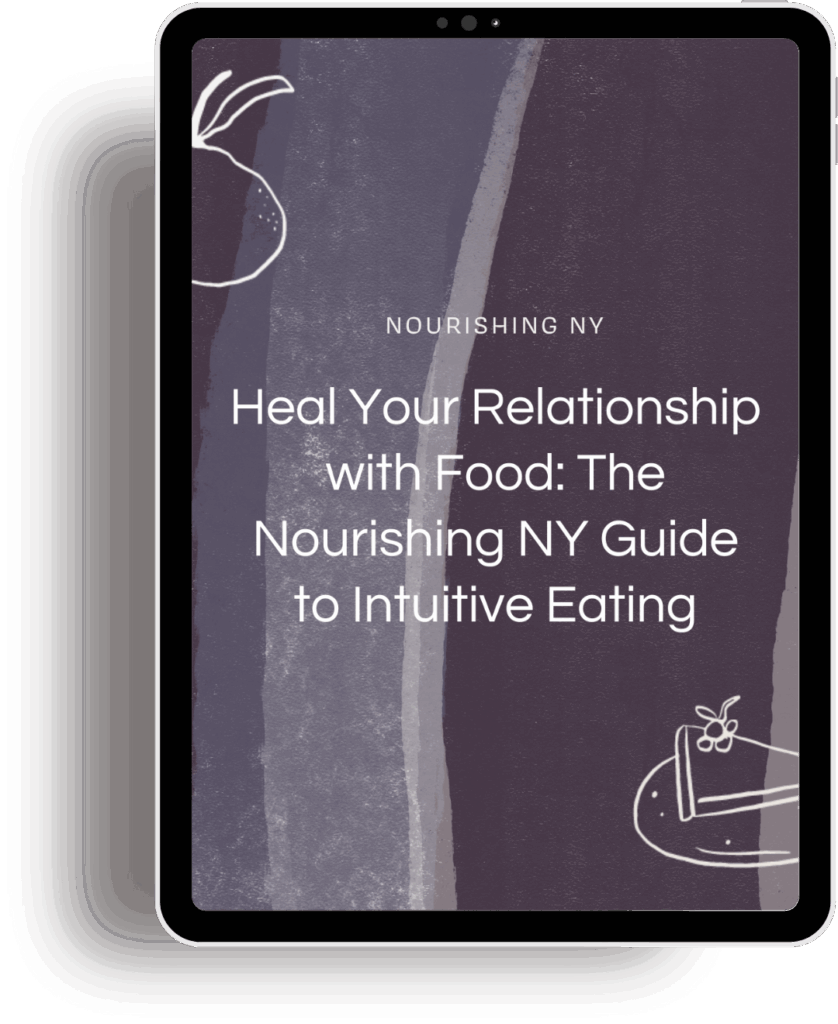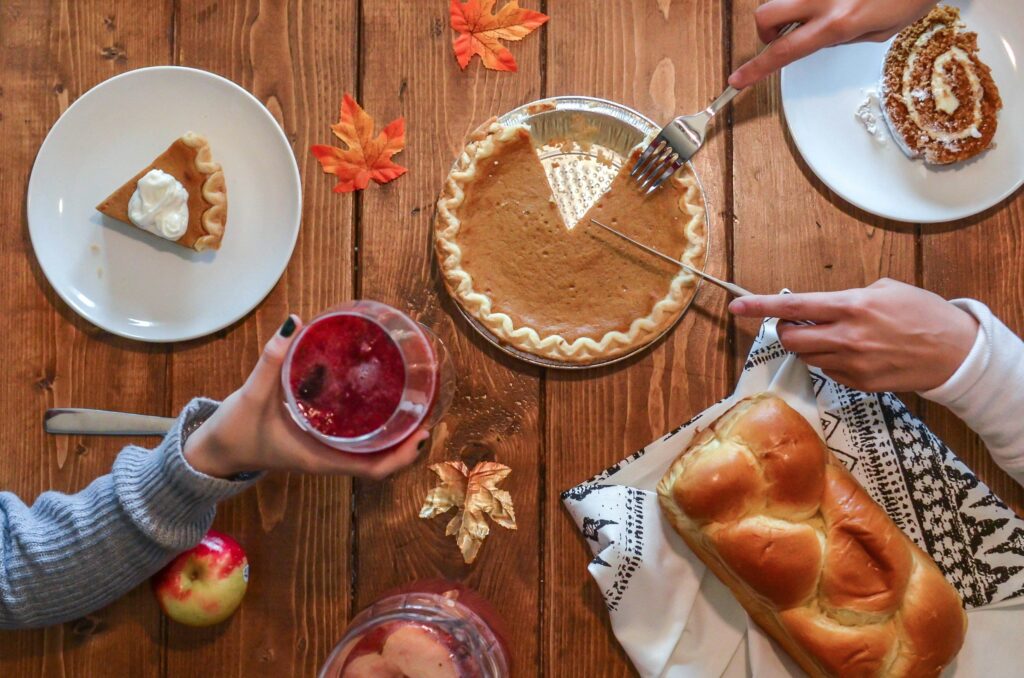Thanksgiving can be a joyful time but also brings challenges, especially for those recovering from an eating disorder. As a seasoned eating disorder dietitian and intuitive eating nutritionist in NYC, Nourishing New York is here to offer practical advice for navigating the holiday season with confidence and self-care.
Understanding the Challenge of Thanksgiving in Recovery
While Thanksgiving is about gratitude, giving thanks, and loved ones, it’s also associated with food. Having an abundance of traditional foods, such as turkey and gravy, stuffing, potatoes, cranberry, and so many others, is a common way to celebrate this holiday. Aside from the food itself, talk of diet and weight may be common amongst families. Some comments you may have heard on Thanksgiving are “I didn’t eat all day so I could enjoy all this food tonight” or “I’m being so bad, my diet will start tomorrow!” Aside from the normalized restriction that is discussed, there’s commonly a focus on exercise. Whether it be the annual “Turkey Trot,” or Thanksgiving specific workout classes on apps, the encouragement of compensation is common in diet culture around this holiday. Whether you’re recovering from an eating disorder or trying to heal your relationship with food, it’s understood by us at Nourishing NY that this holiday can be challenging. An eating disorder dietitian can help support you and help you navigate this Thanksgiving.
5 Strategies to Prepare for Thanksgiving with an Eating Disorder Nutritionist in NYC
1) Plan ahead with your treatment team.
If you’re working with an eating disorder dietitian, they can help you make a game plan for the day before, day of, and day after Thanksgiving. An intuitive eating nutritionist can help you follow your meal plan by creating meal and snack ideas, identifying individual coping strategies for before/during/after meals, and provide you with nutrition education on how to build a Thanksgiving plate that is both nourishing and satisfying.
2) Set boundaries.
We understand setting boundaries can be difficult though it can also be necessary. Whether it’s changing the subject of an uncomfortable conversation, leaving the room to get some fresh air, or telling family members ahead of time how they can support you on Thanksgiving, boundaries are essential. Your therapist and eating disorder dietitian can help support you in setting these boundaries beforehand.
3) Surround yourself with supportive loved ones.
Before Thanksgiving pick a support person. This could be someone who is celebrating with you or a family member or friend that you can call or text if you need support or distraction.
4) Eat breakfast, snack, lunch, or whatever other meals or snacks come before Thanksgiving dinner.
Families start Thanksgiving dinner at all different times of day. One of the most important ways to enjoy an intuitive, mindful Thanksgiving dinner is to eat meals and snacks as regularly scheduled before the dinner. If we restrict before the Thanksgiving meal, we are likely going to feel very hungry (think 0-2 on hunger/fullness chart) and we may be less mindful of our Thanksgiving plate. It’s also really challenging to stay present and in the moment when you’re starving! At Nourishing NY, we recommend you plan ahead meals and snacks with your eating disorder dietitian for accountability and support. Reminder: there are no “good” or “bad” foods and you do not need to compensate for enjoying your Thanksgiving meal.
5) Remind yourself what you’re thankful for.
Thanksgiving involves a lot of food, but it isn’t only about food! Take time to remind yourself what you’re grateful for. Journaling before the meal, after the meal, or reminding yourself throughout the day can be a compassionate way to connect with the holiday and your loved ones.
Dealing with Diet Culture During Thanksgiving Gatherings
Since diet culture is so prevalent in our society, there may be comments made regarding body, weight, and/or dieting at the Thanksgiving table. As eating disorder nutritionists in NYC, we recommend discussing a coping plan ahead of time with your eating disorder dietitian and/or therapist. Here are some ways one may address or cope with triggering comments at the table:
-
Re-direct the conversation completely. If someone brings up weight, diet, exercise, or any other topic that feels triggering, ask another direct question to a loved one at the table to change the subject.
-
If comfortable being direct, say “I would really appreciate it if we didn’t discuss this topic. Let’s talk about what we’re thankful for instead.”
-
Leave the room for a few minutes to get some fresh air.
-
Call or text your support person. If they’re present, engage in conversation with them or leave the table with them to get support.
-
Practice empathy. Remind yourself that whatever comments someone makes about food/weight/body reflects their own relationship with food or body. Remind yourself that you are in recovery and working on healing that relationship for yourself.
Practicing Mindfulness and Gratitude
Practicing mindfulness and gratitude on Thanksgiving can help you focus on positives beyond the food. Below are some helpful tips to integrate mindfulness and give thanks at your Thanksgiving dinner.
-
At the start of the meal, check in with your mind and body. Are you noticing any hunger? What does this feel like?
-
Identify any emotions or thoughts in the moment. Acknowledge them and remember that regardless of what thoughts or emotions come up around the food, eating is necessary and self-care.
-
At the end of the meal, check in with your mind and body again. Are you noticing fullness? What does this feel like? Do you feel like you can go back for seconds? Or are you satisfied? Did you enjoy the meal?
-
Identify what you’re grateful for. Encourage family members, friends, and/or loved ones with you at dinner to do the same.
Frequently Asked Questions Answered by an Eating Disorder Dietitian in NYC
“How can I avoid restricting before Thanksgiving dinner?”
Be sure to work with an eating disorder dietitian or intuitive eating nutritionist to plan ahead. Find meals and snacks that are accessible and feel comfortable. Remind yourself that you do not need to compensate through restriction, exercise, or any other forms to eat Thanksgiving dinner. Remind yourself that you have unconditional permission to eat this meal, dessert, and every other meal.
“What if family members comment on my eating habits?”
Set whatever boundary you feel most comfortable with in the moment. Whether that be redirecting the conversation, reminding them you’re listening to your body or that you’re in recovery, or looking to your support person in the room, set that boundary. Remind yourself that your eating habits and behaviors are no one else’s business (unless you feel comfortable discussing).
“What if I feel uncomfortably full?”
That’s okay! Part of the normal eating definition by Ellyn Satter is: “Normal eating is overeating at times, feeling stuffed and uncomfortable. And at times it can be undereating and wishing you had more. Normal eating is trusting your body…” To cope with the discomfort, utilize skills identified in your cope ahead plan that you made with either your eating disorder dietitian or therapist.
Find Support with an Eating Disorder Nutritionist in NYC
An eating disorder nutritionist and/or dietitian in NYC can be beneficial in so many ways. Whether you are in eating disorder recovery or looking to improve your relationship with food, an eating disorder dietitian can provide specialized nutrition care. Our team of registered dietitians at Nourishing NY provide more than just meal plans and assessments of your current nutrition intake. Our eating disorder dietitians provide nutrition counseling through a weight neutral lens, practice Health at Every Size (HAES) principles, dismantle food myths created by diet culture, and support you in exploring your relationship with food. We at Nourishing NY understand that food is so much more than just nutrition.



